Diplomatic Bluebook 2016
Chapter 3
Japan’s Foreign Policy to Promote National and Worldwide Interests
5.Japan’s efforts at the United Nations (UN)
(1) The United Nations (UN)
A. Japan-United Nations (UN) Relationship
The year 2016 marks the 60th anniversary of Japan joining the UN. Since joining the UN in 1956, Japan has proactively contributed to the world peace and prosperity in close cooperation with the UN.
In 2015, the UN marked the 70th anniversary of its foundation. The UN is an international organization with a universal character, in which almost all the countries in the world join (193 countries as of December 2015). It addresses challenges which the international community faces in various areas, including conflict resolution and peacebuilding, counter-terrorism, disarmament and non-proliferation, development, human rights, environment and climate change, and disaster risk reduction. Furthermore, with information and knowledge gathered from all over the world, the UN is able to present possible solutions to these issues, backed by its high expertise.
With these advantages, the UN is important for Japan to develop peace and stability of the international environment and to realize its sustainable growth while ensuring its national security. Through the UN framework, Japan proactively participates in agenda-setting and rule-making in the international community. By this means, Japan aims to achieve its foreign policy objectives such as response to global issues that cannot be attained by its unilateral efforts.
In September, Prime Minister Abe and Foreign Minister Kishida attended the 70th UN General Assembly.
In his address to the UN General Assembly, Prime Minister Abe emphasized that Japan would further contribute to the world as a “Proactive Contributor to Peace” based on the principle of international cooperation, highlighting Japan’s orientation as a peace-loving nation and its contributions to the UN and the international community since the end of World War II. He also expressed his willingness to realize Security Council reform in order to make the UN better reflect the realities of the 21st century and to make further efforts for world peace and prosperity as a permanent member of the Security Council.
Prime Minister Abe made a statement at the UN Summit that adopted “the 2030 Agenda for Sustainable Development.” He declared that Japan would make maximum efforts to implement the Agenda with specific measures to contribute to “quality growth” and “protection and capacity building of people in vulnerable situation.” He also attended the Global Leaders’ Meeting on Gender Equality and Women’s Empowerment (Beijing +20), a high-level working lunch on climate change, a side event on health “the Path towards UHC (Universal Health Coverage),” and the second Leaders’ Summit on Peacekeeping. At these occasions, he presented Japan’s proactive contribution to the solutions for global issues.
Furthermore, Prime Minister Abe attended the G4 (Japan, India, Germany and Brazil) Summit meeting, in which the leaders reaffirmed their cooperation for an early realization of the Security Council reform. He also had a meeting with Mr. Mogens Lykketoft, President of the 70th session of the UN General Assembly, agreeing to cooperate more closely on issues such as Security Council reform, development and climate change to ensure that the current UN General Assembly, which marks the 70th anniversary of the foundation of the UN become a historic session. Prime Minister Abe also held Summit meetings with leaders from the chair countries of Regional Economic Communities (RECs) as well as from the Pacific island countries, and vigorously held summit level meetings with leaders from various countries.
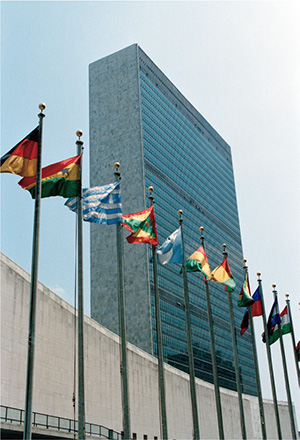 UN Headquarters; Photo: UN Photo/Milton Grant
UN Headquarters; Photo: UN Photo/Milton GrantIn addition, Prime Minister Abe attended a dialogue with North America’s finance/business community members during his stay in New York to give a lecture and had a round table session. He also made a speech at the Invest Japan Seminar and the Visit Japan Tourism Seminar. A reception of Japanese food and a dinner party for the realization of “a society where women shine” were also hosted. Taking every opportunity, Prime Minister Abe promoted the policies and diverse appealing points of Japan. Prime Minister Abe, together with Foreign Minister Kishida, also attended a social gathering with the UN Japanese staff, providing them with encouragement.
Foreign Minister Kishida co-chaired the 9th Conference on Facilitating the Entry into Force of the Comprehensive Nuclear-Test-Ban Treaty (CTBT) and attended six multilateral meetings in total, including the Major Economies Forum on Energy and Climate and G7-related meetings on humanitarian assistance to refugees. Foreign Minister Kishida held meetings with foreign ministers from three countries. During his attendance at the UN General Assembly, he also strengthened mutual trust with other foreign ministers.
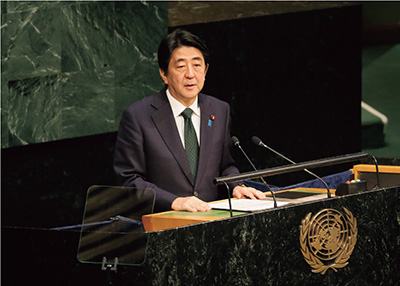 Prime Minister Abe attending the UN General Assembly (September 29, New York, U.S.; Photo: Cabinet Public Relations Office)
Prime Minister Abe attending the UN General Assembly (September 29, New York, U.S.; Photo: Cabinet Public Relations Office)In March 2015, UN Secretary-General Ban Ki-moon visited Japan, attending the Third UN World Conference on Disaster Risk Reduction held in Sendai, and the Symposium on the 70th Anniversary of the UN held at the United Nations University.UN Secretary-General Ban Ki-moon stated in his speech that the UN places a high value on partnership with Japan and expressed his deep appreciation for Japan’s international contributions. Responding to this, Prime Minister Abe expressed in his speech that Japan sets the two years of 2015, the 70th anniversary of the founding of the UN, and 2016, the 60th anniversary of Japan’s membership to the UN, as the “Years for Concrete Actions.” He also stated that Japan would proactively work on a range of global issues and stressed the necessity to achieve concrete results in Security Council reform. Prime Minister Abe and Foreign Minister Kishida also held a meeting with UN Secretary-General Ban Ki-moon, and agreed that Japan and the UN would continuously cooperate to solve various issues faced by the international community.
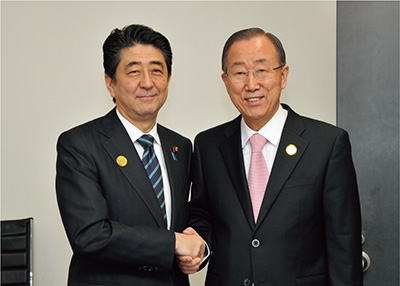 Meeting between Prime Minister Abe and UN Secretary-General Ban Ki-moon (March 14, Sendai; Photo: Cabinet Public Relations Office )
Meeting between Prime Minister Abe and UN Secretary-General Ban Ki-moon (March 14, Sendai; Photo: Cabinet Public Relations Office )In September, the President of the 70th session of the UN General Assembly Lykketoft visited Japan. He met Prime Minister Abe and Foreign Minister Kishida, and discussed the importance of various agendas such as making progress in Security Council reform, development, climate change, disarmament and non-proliferation, and women-related issues. They confirmed that Japan and the UN would further cooperate in addressing these issues. President Lykketoft also visited Hiroshima and had a meeting with the mayor of Hiroshima city. He also paid a visit and offered flowers to the Memorial Cenotaph for the Atomic Bomb Victims.
B. The Security Council of the United Nations (UN Security Council) and its Reform
(a) The Security Council of the United Nations (UN Security Council)
The UN Security Council holds the primary responsibility within the UN for maintaining international peace and security. Its activities, including peacekeeping operations based on UN Security Council resolutions, are becoming more diversified and its role is expanding year by year, encompassing the efforts to address new threats such as the proliferation of weapons of mass destruction and terrorism.
In October, Japan was elected as a non-permanent member of the UN Security Council for the 11th time, which ranks highest among all UN member states. From January 2016, Japan began its two-year term of non-permanent membership in the UN Security Council.
(b) Reform of the Security Council of the United Nations
The composition of the UN Security Council basically remains the same 70 years after the foundation of the UN, and there is a shared recognition in the international community that it should be reformed without delay, in order to improve its representativeness, effectiveness and transparency.
Japan is making outreach efforts to other countries aiming at an early realization of Security Council reform and Japan’s admission as a permanent member through an expansion of the number of both permanent and non-permanent seats.
(c) Recent activities regarding reform of the Security Council of the UN
The intergovernmental negotiations within the UN General Assembly have been continuing since 2009. In July, the President of the 69th session of the UN General Assembly, Sam Kahamba Kutesa, delivered documents to the member states, assembling proposals submitted by the groups and countries representing approximately 120 countries, and serving as the basis for intergovernmental negotiations.
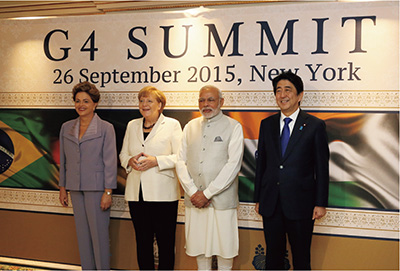 Prime Minister Abe at the G4 (Japan, India, Germany, and Brazil) Summit for UN Security Council Reform (September 26, New York, U.S.; Photo: Cabinet Public Relations Office)
Prime Minister Abe at the G4 (Japan, India, Germany, and Brazil) Summit for UN Security Council Reform (September 26, New York, U.S.; Photo: Cabinet Public Relations Office)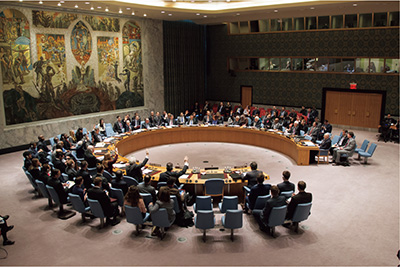 UN Security Council Chamber (Photo: UN Photo/Loey Felipe)
UN Security Council Chamber (Photo: UN Photo/Loey Felipe)In order to achieve concrete results during the 70th session of the UN General Assembly which marks the 70th Anniversary of the foundation of the UN, Japan further strengthened its efforts as a member of the G4 (Japan, India, Germany, and Brazil) in 2015. At the occasion of the 70th session of the UN General Assembly in September, Japan held a G4 Summit meeting in New York for the first time in 11 years since 2004. G4 leaders reaffirmed the urgent need to adapt the UN Security Council to the reality of the 21st century. They agreed to closely cooperate for realization of early and meaningful UN Security Council reform and accelerate outreach to reform-oriented members for the reform.
With the aim of realizing Security Council reform, Japan is making proactive efforts in outreaching states and regions in Africa and the Caribbean Community (CARICOM). In relations with Africa, Parliamentary Vice-Minister for Foreign Affairs Uto attended the AU General Assembly meetings in January and June, and visited Tunisia and Senegal in March. State Minister for Foreign Affairs Kihara visited Tanzania in December, and Parliamentary Vice-Minister for Foreign Affairs Kikawada visited five countries in Africa. UN reform was also discussed when leaders of African countries visited Japan, such as the visits of South African Vice President Cyril Ramaphosa in August and Ugandan President Yoweri Museveni in September. In relations with CARICOM, outreach was conducted when State Minister for Foreign Affairs Nakayama attended the Council for Foreign and Community Relations (COFCOR) in May, and when Prime Minister Abe visited Jamaica in September.
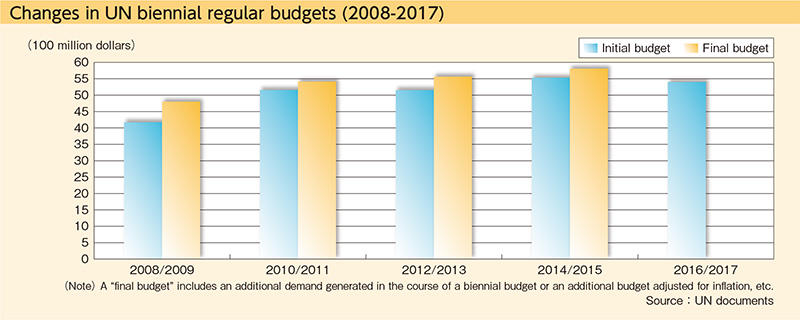
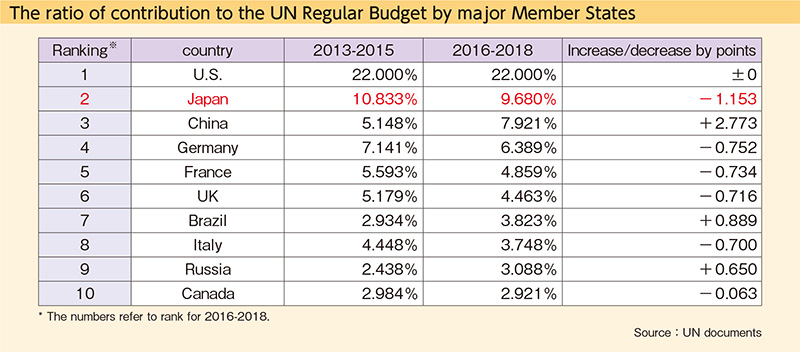
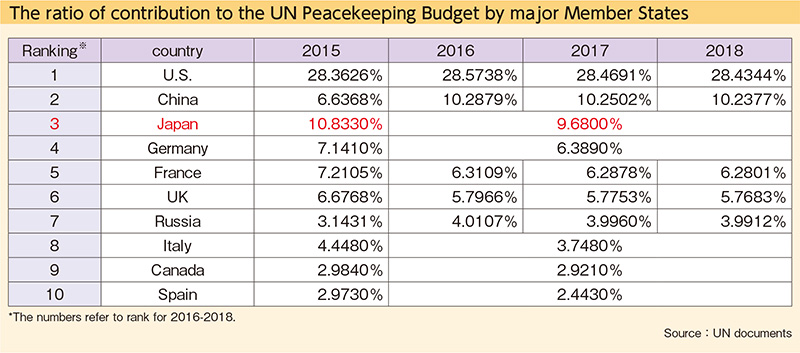
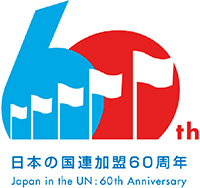 Official logo of Japan’s 60th anniversary of accession to the UN
Official logo of Japan’s 60th anniversary of accession to the UNOn December 18, 1956, Foreign Minister Mamoru Shigemitsu gave the speech at a UN General Assembly hall on the occasion of Japan’s accession to the UN. In his speech, Foreign Minister Shigemitsu, quoting the preamble of Japan’s Constitution, “The people of Japan today desire peace for all time and are deeply conscious of the high ideals controlling human relationships,” declared that the conviction of the Japanese people is in complete accord with the purposes and principles of the UN Charter, and expressed the resolve of Japan to sincerely serve the high cause of the UN. For 60 years since accession, Japan has continued to observe this resolve, and has been contributing to the peace and prosperity of the world through the UN.
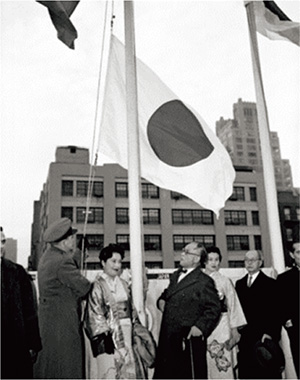 Foreign Minister Mamoru Shigemitsu attending the hoisting of the national flag at the UN Headquarters;
Foreign Minister Mamoru Shigemitsu attending the hoisting of the national flag at the UN Headquarters;Photo: UN Photo / MB
The UN has been working on new challenges in accordance with the needs of the times. In 2015, under the UN framework, “the Sendai Framework for Disaster Risk Reduction 2015-2030” was adopted in the field of disaster risk reduction, “the 2030 Agenda for Sustainable Development” was adopted in the field of development and “the Paris Agreement” was adopted in the field of climate change. While contributing to the resolution of these common challenges for all humanity in close cooperation with the UN, Japan intends to take the lead to reform the UN, including the Security Council, thereby enabling the UN to respond more effectively to new challenges.
C. Administrative and Budgetary Issues of the United Nations
(a) Budget of the United Nations
The UN budget is mainly composed of the regular budget which is the biennial budget for the period from January to December of the next year, and the peacekeeping budget which is the one-year budget for the period from July to the following June.
The regular budget for the biennium 2016-2017 amounting to approximately 5.4 billion US dollars was approved in December 2015. The approved budget is approximately 8% less than the amount of the final budget for the biennium 2014-2015 which is approximately 5.81 billion US dollars. In June 2015, the budgets for peacekeeping operations for the period from 1 July 2015 to 30 June 2016, amounting to approximately 8.27 billion US dollars in total, were approved (2.37% down from the final budget for the previous year).
In 2015, the General Assembly approved the scale of assessments, which is reviewed every three years and the current method to calculate the scale of assessments was maintained. As a result, Japan’s assessment rate of the regular budget for 2016 to 2018 dropped to 9.680% from 10.833% for 2013-2015 but continues to rank second only to the U.S. (however, in terms of scale of assessments for the peacekeeping budget, China ranked second and Japan third). While assessment rate of Japan was the biggest drop among all the member states, those of emerging countries, including China, Brazil, and Russia, increased.
In January 2011, Japan announced its candidacy for the election of Non-permanent Members of the UN Security Council (Term of office is 2 years; 5 seats are elected annually). However, Bangladesh had already presented its bid for the one seat assigned to the Asia-Pacific Ocean Group, which Japan also belongs to.
In order to deepen understanding and seek support for the contributions which Japan could make as a member of the Council, Japan continued its efforts by using occasions of high-ranking officialsʼ visits as well as by inviting some Ambassadors Extraordinary and other countries/Permanent Representatives to the United Nations to Japan and arrange occasions such as meetings with Japanese leaders and varieties of visits, so as to deepen their understanding of Japan from broaden perspectives.
Under such circumstances, on the occasion of Prime Minister Abe’s visit to Bangladesh in September 2014, following the visit of Foreign Minister Kishida to Bangladesh in March 2014, Prime Minister Hasina expressed that her country will withdraw its bid for a non-permanent seat in the Security Council in favor of Japan and support Japan, taking into consideration of the historically good relationship between the two countries.
In the election held at the UN General Assembly on October 16, 2015, Japan secured support from an overwhelming majority of the UN Member States, totaling 184 countries, and was elected to be a Non-permanent Member of the Security Council for a record-high 11th time. Japan intends to make further contributions on a wide range of issues raised by the UN Security Council, such as the North Korean issues and peace and stability in the Middle East and Africa, by putting into practice the principle of “Proactive Contribution to Peace” based on the principle of international cooperation.
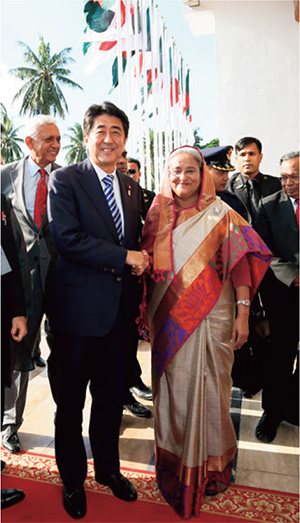 Prime Minister Abe receiving a welcome from Prime Minister Hasina
Prime Minister Abe receiving a welcome from Prime Minister Hasina(September 6, 2014, Bangladesh; Photo: Cabinet Public Relations Office)
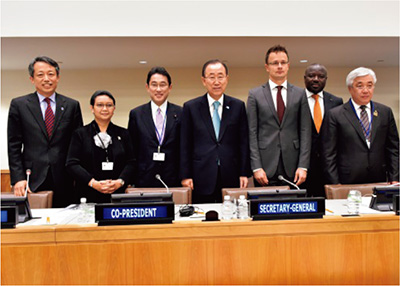 Foreign Minister Kishida attending the 70th UN General Assembly (September 29, NY, U.S.)
Foreign Minister Kishida attending the 70th UN General Assembly (September 29, NY, U.S.)(b) Japan’s Contribution
The budget, which supports the activities of the UN, is composed of assessed contributions by member states and voluntary contributions made by member states in accordance with their policy needs. With regard to the assessed contributions, Japan contributes approximately 290 million US dollars for the UN regular budget in 2015, and approximately 690 million US dollars to the peacekeeping budget in 2015, ranking second only to the U.S. As a major financial contributor, Japan has been encouraging the UN to make more efficient and effective use of its resources.
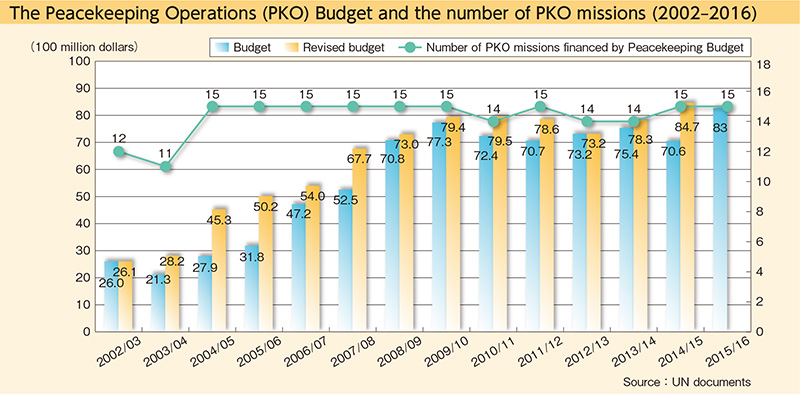
UN Secretary-General Ban Ki-moon has promoted management reform as one of his priorities and Japan supports his initiative. It is expected that such reforms will enhance efficiency of the financial, budgetary, and human resource management. However, it is anticipated that it will take some time to realize benefit from the measures introduced previously. While continuing to bridge differences in their respective views of member states, Japan is actively contributing to the discussion with other member states and the UN Secretariat to ensure concrete progress in the administrative and budgetary reforms.


